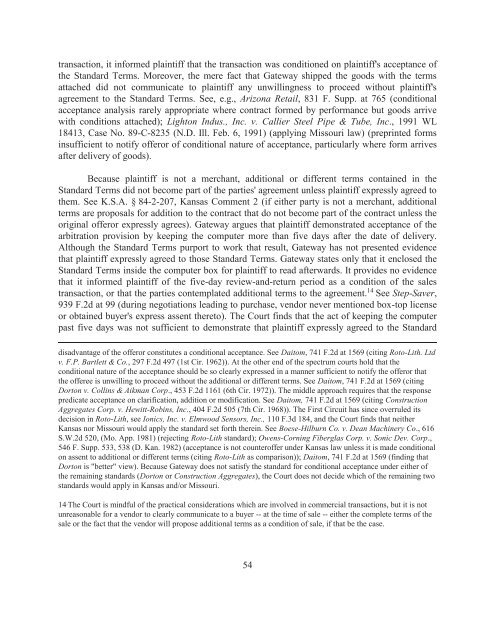Sales and Leases - A Problem-based Approach, 2016a
Sales and Leases - A Problem-based Approach, 2016a
Sales and Leases - A Problem-based Approach, 2016a
You also want an ePaper? Increase the reach of your titles
YUMPU automatically turns print PDFs into web optimized ePapers that Google loves.
transaction, it informed plaintiff that the transaction was conditioned on plaintiff's acceptance of<br />
the St<strong>and</strong>ard Terms. Moreover, the mere fact that Gateway shipped the goods with the terms<br />
attached did not communicate to plaintiff any unwillingness to proceed without plaintiff's<br />
agreement to the St<strong>and</strong>ard Terms. See, e.g., Arizona Retail, 831 F. Supp. at 765 (conditional<br />
acceptance analysis rarely appropriate where contract formed by performance but goods arrive<br />
with conditions attached); Lighton Indus., Inc. v. Callier Steel Pipe & Tube, Inc., 1991 WL<br />
18413, Case No. 89-C-8235 (N.D. Ill. Feb. 6, 1991) (applying Missouri law) (preprinted forms<br />
insufficient to notify offeror of conditional nature of acceptance, particularly where form arrives<br />
after delivery of goods).<br />
Because plaintiff is not a merchant, additional or different terms contained in the<br />
St<strong>and</strong>ard Terms did not become part of the parties' agreement unless plaintiff expressly agreed to<br />
them. See K.S.A. § 84-2-207, Kansas Comment 2 (if either party is not a merchant, additional<br />
terms are proposals for addition to the contract that do not become part of the contract unless the<br />
original offeror expressly agrees). Gateway argues that plaintiff demonstrated acceptance of the<br />
arbitration provision by keeping the computer more than five days after the date of delivery.<br />
Although the St<strong>and</strong>ard Terms purport to work that result, Gateway has not presented evidence<br />
that plaintiff expressly agreed to those St<strong>and</strong>ard Terms. Gateway states only that it enclosed the<br />
St<strong>and</strong>ard Terms inside the computer box for plaintiff to read afterwards. It provides no evidence<br />
that it informed plaintiff of the five-day review-<strong>and</strong>-return period as a condition of the sales<br />
transaction, or that the parties contemplated additional terms to the agreement. 14 See Step-Saver,<br />
939 F.2d at 99 (during negotiations leading to purchase, vendor never mentioned box-top license<br />
or obtained buyer's express assent thereto). The Court finds that the act of keeping the computer<br />
past five days was not sufficient to demonstrate that plaintiff expressly agreed to the St<strong>and</strong>ard<br />
disadvantage of the offeror constitutes a conditional acceptance. See Daitom, 741 F.2d at 1569 (citing Roto-Lith. Ltd<br />
v. F.P. Bartlett & Co., 297 F.2d 497 (1st Cir. 1962)). At the other end of the spectrum courts hold that the<br />
conditional nature of the acceptance should be so clearly expressed in a manner sufficient to notify the offeror that<br />
the offeree is unwilling to proceed without the additional or different terms. See Daitom, 741 F.2d at 1569 (citing<br />
Dorton v. Collins & Aikman Corp., 453 F.2d 1161 (6th Cir. 1972)). The middle approach requires that the response<br />
predicate acceptance on clarification, addition or modification. See Daitom, 741 F.2d at 1569 (citing Construction<br />
Aggregates Corp. v. Hewitt-Robins, Inc., 404 F.2d 505 (7th Cir. 1968)). The First Circuit has since overruled its<br />
decision in Roto-Lith, see Ionics, Inc. v. Elmwood Sensors, Inc., 110 F.3d 184, <strong>and</strong> the Court finds that neither<br />
Kansas nor Missouri would apply the st<strong>and</strong>ard set forth therein. See Boese-Hilburn Co. v. Dean Machinery Co., 616<br />
S.W.2d 520, (Mo. App. 1981) (rejecting Roto-Lith st<strong>and</strong>ard); Owens-Corning Fiberglas Corp. v. Sonic Dev. Corp.,<br />
546 F. Supp. 533, 538 (D. Kan. 1982) (acceptance is not counteroffer under Kansas law unless it is made conditional<br />
on assent to additional or different terms (citing Roto-Lith as comparison)); Daitom, 741 F.2d at 1569 (finding that<br />
Dorton is "better" view). Because Gateway does not satisfy the st<strong>and</strong>ard for conditional acceptance under either of<br />
the remaining st<strong>and</strong>ards (Dorton or Construction Aggregates), the Court does not decide which of the remaining two<br />
st<strong>and</strong>ards would apply in Kansas <strong>and</strong>/or Missouri.<br />
14 . The Court is mindful of the practical considerations which are involved in commercial transactions, but it is not<br />
unreasonable for a vendor to clearly communicate to a buyer -- at the time of sale -- either the complete terms of the<br />
sale or the fact that the vendor will propose additional terms as a condition of sale, if that be the case.<br />
54


















